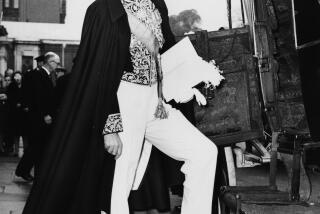‘Heart of Darkness’ or a Challenge? : Africa: Equatorial Guinea has a wretched reputation around the State Department. ‘You will go to America as a corpse,’ the U.S. ambassador was warned.
- Share via
WASHINGTON — The mere mention of Equatorial Guinea around the State Department usually is greeted with knowing nods, based mostly on an incident there years ago worthy of Agatha Christie.
On a steamy late August day in 1971, amid signs of a homosexual relationship gone sour, a U.S. diplomat plunged a pair of scissors into a colleague inside the Embassy compound, killing him.
The full explanation as to why Alfred J. Erdos, 46, murdered Donald Leahy, 47, has never come to light. But some officials believe the appalling circumstances at that time in the tiny country, run by one the world’s most ruthless dictators, were at least partly to blame.
The State Department signaled sympathy for that view by shutting the embassy down for the next eight years.
The incident earned the remote, Maryland-sized country a reputation as among the most challenging assignments for a diplomat.
Things don’t seem to have changed. Last February, for example, U.S. Ambassador John Bennett received a death threat from a man he believes is an official of the Equatorial Guinean government.
Bennett does not take the threat seriously but thinks the government tried to intimidate him because of his aggressive stand against the persistent use of torture against detainees.
As described by a U.S. official, the note containing the death threat was thrown out of a passing vehicle Feb. 4 near Bennett’s residence in the seaside capital of Malabo. “You will go to America as a corpse,” the message warned.
Eyewitnesses identified the driver as a government official.
The sense of exasperation was compounded when Equatorial Guinean officials implied that Bennett wrote the letter himself as a means of discrediting the government. Bennett’s appeals to officials in Malabo for an investigation were ignored.
Bennett spends much of his time attempting to persuade the government to treat detainees humanely. Last December, he tried to intercede on behalf of more than 100 detainees--described by the State Department as students, educators and priests--who were beaten repeatedly by police with rubber truncheons.
When the detainees--some severely wounded--were released after 11 days of intermittent torture, Bennett and several other diplomatic colleagues offered to have the group flown to neighboring Cameroon for treatment. The government refused.
Bennett’s work does some good, however. Some Equatorial Guineans attempt to keep the police at bay by attaching American flags to their clothing, thus leaving the impression they have influential connections.
Equatorial Guinea is a geographical oddity. Part of the country is connected to the African mainland just north of the Equator and the rest is a nearby island where the capital is located. Once a prosperous colony of Spain, the nation has been on a downhill slide since gaining independence in 1968.
It is a country where extraordinary mystical powers are ascribed to ancestral skulls. Malaria is everywhere, but the country has no newspaper. Its president, Brig. Gen. Teodoro Obiang Nguema Mbasogo, wrote a clause into the constitution guaranteeing he would never be prosecuted for any act committed before, during or after his time in office.
He sent an in-law as his ambassador to the United States. In a rare communication with the State Department, the envoy sent a message complaining about Bennett’s behavior, addressing it to Secretary of State “Christopher Warren.” The secretary’s name is Warren Christopher.
Despite the country’s dismal human rights record, Obiang is considered more benign than his predecessor, Fransisco Macias Nguema Biyongo, under whose tyrannical rule between 1968 and 1979 more than 20,000 persons were killed, about 6% of the population.
Among those slain, according to African affairs expert Randall Fegley, were 18 Cabinet ministers and 22 national and provincial legislators.
It was during that period when Erdos, who had been sent to Equatorial Guinea because he was considered unflappable, killed Leahy. The incident took place in what was known as the “code room,” a tiny communications center at the Embassy.
Within hours, U.S. diplomats from neighboring Cameroon were sent to investigate. After being flown back to Washington, Erdos was tried, convicted and sentenced to three years in prison on manslaughter charges.
The prosecution said Erdos and Leahy were lovers whose relationship had gone bad.
Erdos, a career diplomat, denied the allegation, citing the “heart of darkness “ theory in his defense. In effect, he contended that life in Equatorial Guinea had driven him insane, at least temporarily.
More to Read
Sign up for Essential California
The most important California stories and recommendations in your inbox every morning.
You may occasionally receive promotional content from the Los Angeles Times.












